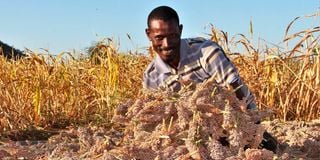Premium
Sorghum throws Kitui farmers a lifeline

James Mukita displays his sorghum at Nzeve Village in Kitui County on February 4, 2023. Sorghum has thrown a lifeline to many farmers in the drought-ravaged region.
Around this time of year, James Mukita would have been preoccupied with preparing his granary ahead of a bumper maize harvest. However, massive crop failure following a prolonged drought experienced in Kitui County has seen the father of four neglect the grain store. But this farmer from Nzeve Village is not worried.
Mukita says smallholder sorghum farmers like him are doing fine as the local farming community reels under prolonged drought.
Having read the signs of the times, the 46-year-old is among dozens of lucky farmers in the semi-arid region who are looking forward to a bumper harvest after they switched to sorghum.
“We expect to produce at least 40 bags of sorghum. Much of it will end up in the market. We are planning to use the money to buy foodstuff such as maize and beans and pay school fees for our three children who are in school,” Mukita tells the Powering SMEs team, which has visited him at his farm, which is teeming with chalky white sorghum of Gadam hybrid variety which is ready for harvesting.
Although Kitui is among the counties where sorghum does well, conservative farmers here despise the hardy crop. Some associate the crop with poverty while others believe it is inferior compared to maize, the region’s staple food. Yet others cite lack of market in their rejection of sorghum.
Negative attitude
Mukita grew up treating sorghum as weed, however, the devastation of farmers in the wake of the prolonged drought saw some of them rethink the negative attitude towards sorghum and other drought resistant crops.
Accurate and timely weather reports and sustained campaigns by government agencies and non-governmental organisations for farmers in dry lands to grow drought resistant crops such as sorghum, cow peas, millet and green grams paid off.
Sorghum thrives in warm areas. Although it does well in a wide range of soil types, it does better in clay soils and light sand soils. Across Yatta and Kwa Vonza regions in Kitui County where sorghum has made a significant comeback, most farmers identify quelea birds as the biggest challenge in sorghum production. The red-billed ravenous birds strike at dawn and dusk.
In addition to setting up scare crows at the farmland, Mukita chases the birds away using a catapult. The outcome has been a bountiful crop. East Africa Breweries Limited (Eabl) has offered the farmers a ready market for sorghum.
"At Sh40 a kilo of sorghum, we expect to earn around Sh150, 000 from our yield this year. This money will enable us buy what we need at home and ensure that we shall not sell our livestock to afford food and school fees," says the farmer.
Sorghum is the main raw material in the production of Senator Keg, a popular beer brand manufactured by Eabl.
"Kitui County is a sleeping giant in terms of sorghum production. Through its production, the county is able to feed itself and its neighbours," Peter Mala, a manager in charge of the sorghum value chain at company, told Powering SMEs.
Besides this business outlet, farmers who have been championing the adoption of high yielding and drought resistant sorghum and millet breeds believe that the biggest market for the hardy cereals lies in flour blending. The government roots for the blending of flours in an effort to promote healthy eating.
Right planting materials
"We are moving with speed to produce the right planting materials which are adapted to the right ecologies where the crops grow so that when the flour blending policy is rolled out, we shall be able to produce the required volumes of grains to run the flour blending system," Eric Manyasa, the head of International Crops Research Institute for Semi-Arid Tropics (Icrisat) in the region, said recently while interesting seed traders and research institutions in new drought resistant sorghum and millet breeds at Kiboko in Makueni County.
The campaign to commercialise sorghum also encourages farmers to trade with schools running feeding programmes and to preserve some of the produce for domestic use.
"Sorghum is nutritious. It contains antioxidants, fibre, protein, Vitamin B, magnesium potassium and iron. Many farmers are also producing sorghum to feed chicken. The stem and leaves of the plant are used to make silage for feeding livestock," says Judy Musyoki, the agribusiness coordinator at Cereal Growers Association, one of the organisations involved in promoting the sorghum value chain, in Kitui County.
The organisation has deployed 120 village-based agriculture extension officers across Kitui County tasked with advising farmers on the appropriate crops and linking them with dealers of certified seeds, agrochemicals, fertilisers, threshing service and hermetic bags.
To enhance the sorghum business, Ms Musyoki encourages sorghum farmers to come together in cooperative societies to reap more from their efforts by enhancing their bargaining power while at the same time reducing the cost of transport and minimising risks of exploitation.





